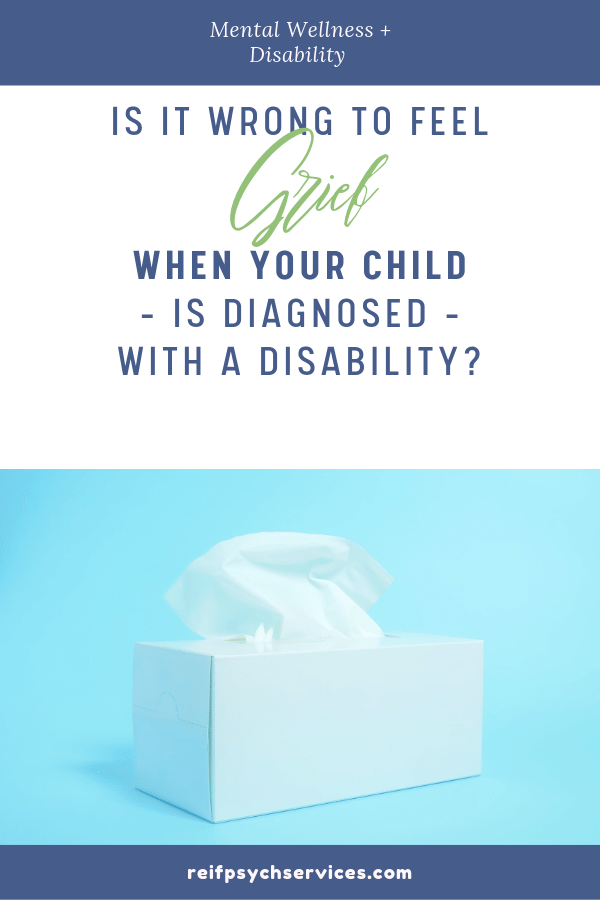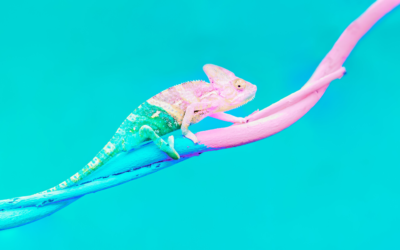I’m a therapist who supports both people with disabilities and their parents. Because of this, I hear perspectives from all sides of disability related discussions in my office.
- Should we use person first language or identity first language?
- Is it better for a disabled adult to live on their own, in a group home, or with their parents?
- Are “Awareness Days” of any value? Or do they get in the way of a culture of acceptance and accommodation?
Right now, there’s a new divide brewing, and it’s one that feels especially fraught.

Is it wrong to feel grief when your child is diagnosed with a disability?
Many disabled adults shout “YES”!
They point to statistics. Like the fact that 99% of teens and adults with Down syndrome are happy with their lives. Or the fact that parents raising kids with Down syndrome report higher than average psychosocial well-being. This phenomenon is so predictable that it has a name: “The Down syndrome advantage”.
Disability advocates worry about what it means if experts and media encourage parents to grieve a diagnosis.
Doesn’t feeling grief mean that the parents are missing out on getting to know and connect with the child they do have?
And yet, research tells us that many parents DO report experiencing grief upon learning that their child has a disability
Research (like this study, and this one) acknowledges that this experience is common among parents raising kids with newly diagnosed disabilities.
What does this mean? Are only pessimistic, “glass half empty” types having kids with disabilities?
Hardly.
Why it’s understandable that you feel grief when your child is diagnosed with a disability
It’s common to daydream about the child you will have. To envision in rich detail the kind of parent you will be. This daydreaming intensifies during pregnancy or while actively awaiting adoption.
According to attachment theories, this indulgence in fantasy serves a critical function.
These daydreams, researchers suggest, equip parents for the draining, exhausting, isolating challenge that is parenting a newborn.
The strength of our hopes about the older child we will have is what enables us to sacrifice and care for the needy, loud, messy newborn in our arms.
This article offers more insight. It also clarifies what happens to parents who learn that their child has a disability.
These parents must adapt to a future in which their daydreams don’t seem possible. They must re-calibrate their expectations of what their child and their parenting experiences will be.
Thus, feeling grief related to a child’s disability doesn’t mean that the parent doesn’t love the child they have. It reflects instead that a parent is in the process of building a new attachment to a child they didn’t expect.
Or, to put it in neurological terms; our brains are not wired to appreciate the child we have without first grieving the loss of the child and the parenting experiences we expected.
This also explains why, for example, Autistic parents don’t tend to experience grief when their child is diagnosed with Autism. These parents are prepared that their child could be on the spectrum. Their daydreaming about the future likely allows for the possibility of an Autistic child. Thus, there is no loss of attachment when they recognize that their child is Autistic.
Those who argue that it’s wrong to feel grief when your child is diagnosed are missing some key information.
Biologically, it would seem, parents are hard wired to experience grief when they learn that their child will not be what they expected. It seems to be a necessary step for those parents who didn’t daydream about a child with disabilities.
Without grieving, you cannot do the mental and emotional work required to re-envision what the future might hold. Grief is the ability to acknowledge and articulate what you have lost. And it is the first step in developing a healthy, loving, secure attachment to your disabled child.
It doesn’t feel good to be in the grieving phase. Many parents wrongly presume that it means that they are inherently flawed. But, to paraphrase my friend and colleague Dr. Emily King, “There are no bad or wrong feelings. There are only feelings that feel bad or wrong to have.”
What’s important to know if you are grieving your child’s disability
Parents, if you are in the throes of that grief now, keep in mind that:
- You are not alone. Your experience is in fact very common and understandable.
- You are not wrong. Your brain was wired to prepare you for one parenting experience, but life had other plans for you. Your grief reflects that you are in the process of developing new ideas about your child’s future, and what your life as their parent will look like.
It makes sense if you feel confused or alone in this. There aren’t many examples or positive ideals for you to look to as you consider your child’s future. There are many more unknowns and insecurities than there were before you knew about your child’s disability. - You aren’t a bad person or a bad parent. That you are grieving doesn’t reflect that you are a flawed parent or a horrible person. Your grief speaks more about the time we live in than it does about who you are. You live in a time where disability isn’t well understood or commonly talked about. Disabled lives are still viewed as lives that are ‘less than’. This is changing, but this change will take time.
Summary
I hope this post has helped you to see that grief is a very normal and expected response when you learn that the child you have will be different from the child you envisioned.
Feeling grief when your child is diagnosed with a disability doesn’t mean that you are a bad, unloving, or unqualified parent. It just means that you are doing the mental and emotional work of recalibrating your expectations. Doing this means that you are working hard to form a secure and loving attachment to the child you have.
If you find that you are stuck in grief and can’t get through it, it makes sense that you’d want support from a professional who has helped other parents like you. I invite you to learn more about the counseling services I offer to parents raising kids with disabilities.











